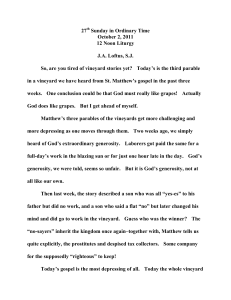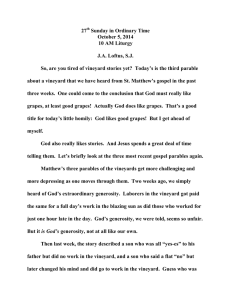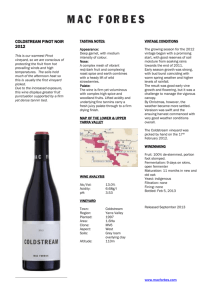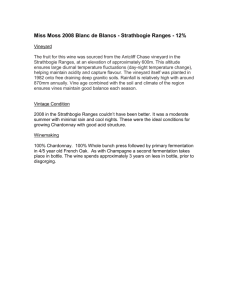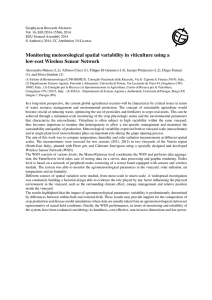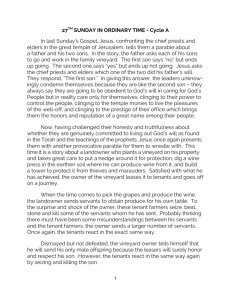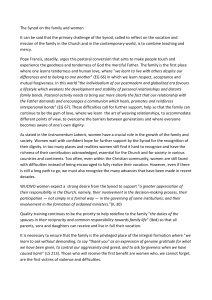27 Sunday in Ordinary Time
advertisement
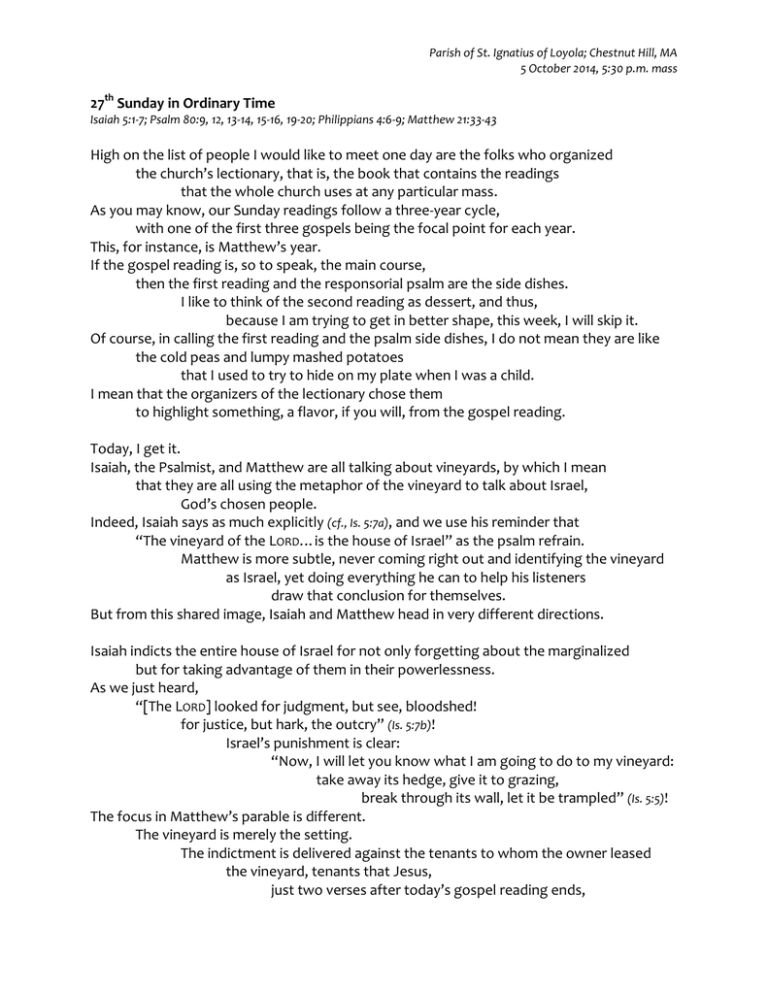
Parish of St. Ignatius of Loyola; Chestnut Hill, MA 5 October 2014, 5:30 p.m. mass 27th Sunday in Ordinary Time Isaiah 5:1-7; Psalm 80:9, 12, 13-14, 15-16, 19-20; Philippians 4:6-9; Matthew 21:33-43 High on the list of people I would like to meet one day are the folks who organized the church’s lectionary, that is, the book that contains the readings that the whole church uses at any particular mass. As you may know, our Sunday readings follow a three-year cycle, with one of the first three gospels being the focal point for each year. This, for instance, is Matthew’s year. If the gospel reading is, so to speak, the main course, then the first reading and the responsorial psalm are the side dishes. I like to think of the second reading as dessert, and thus, because I am trying to get in better shape, this week, I will skip it. Of course, in calling the first reading and the psalm side dishes, I do not mean they are like the cold peas and lumpy mashed potatoes that I used to try to hide on my plate when I was a child. I mean that the organizers of the lectionary chose them to highlight something, a flavor, if you will, from the gospel reading. Today, I get it. Isaiah, the Psalmist, and Matthew are all talking about vineyards, by which I mean that they are all using the metaphor of the vineyard to talk about Israel, God’s chosen people. Indeed, Isaiah says as much explicitly (cf., Is. 5:7a), and we use his reminder that “The vineyard of the LORD…is the house of Israel” as the psalm refrain. Matthew is more subtle, never coming right out and identifying the vineyard as Israel, yet doing everything he can to help his listeners draw that conclusion for themselves. But from this shared image, Isaiah and Matthew head in very different directions. Isaiah indicts the entire house of Israel for not only forgetting about the marginalized but for taking advantage of them in their powerlessness. As we just heard, “[The LORD] looked for judgment, but see, bloodshed! for justice, but hark, the outcry” (Is. 5:7b)! Israel’s punishment is clear: “Now, I will let you know what I am going to do to my vineyard: take away its hedge, give it to grazing, break through its wall, let it be trampled” (Is. 5:5)! The focus in Matthew’s parable is different. The vineyard is merely the setting. The indictment is delivered against the tenants to whom the owner leased the vineyard, tenants that Jesus, just two verses after today’s gospel reading ends, identifies as “the chief priests and Pharisees” (Mt. 21:45). For Matthew, a day of reckoning is to come not for all of Israel, not for the vineyard, but for Israel’s leadership at the time of his writing. Now, back to our lectionary organizers. Could it be that they played simple word association, saw “vineyard”…”vineyard,” and thought they had a perfect match? Theoretically, I suppose so, but I think it far more likely that they wanted to highlight subtly a common technique in the gospels: reaching into the past for a familiar story, image, or event, and retrieving it to address a present situation. Sometimes, like today, the retrieval has a fair amount of poetic license to it. After all, this is redeploying a story, not simply cutting and pasting it. But such retrievals can have the effect of inspiring us to do likewise with the biblical sources we encounter: we can often use them to make sense of our lives, both individually, and communally. Tonight, for instance, I think that we can retrieve the gospel reading we just heard to address a present situation in our church, namely, today’s start of the Extraordinary General Assembly of the Synod of Bishops. It is probably best to put aside, for the moment, some of the press that the Synod has garnered recently: marriage, the family, the reception of Holy Communion for divorced and civilly-remarried Catholics, and the disagreements over these matters among so many people, including not a few cardinals. These all have their proper place, but the most important issue or question facing any synod, a word that simply means “the road together,” or “the road with,” is how will we, the church, now, walk the road of life together, guided by the Spirit, on pilgrimage toward the fullness of life with God? The parable of the vineyard offers three suggestions concerning the road ahead of us. First, we will walk the road together with God accompanying us. The landowner does not give up on the tenants, but keeps sending messengers to them over and over again. Even when these particular tenants refuse to be in right relationship with the landowner, he does not give up on the whole business of renting his vineyard. He finds new tenants, new partners. The message for the Synod is clear: God, if we listen hard enough, will prove to be anything but the silent partner. Second, we will walk the road together with disagreement and difference accompanying us. While it is unlikely that the Synod will ever collapse into beating, stoning, and killing, 2 it is equally unlikely that everyone present will be in complete agreement with one another on all points. When we say in a few moments that we believe in a church that is one, holy, catholic, and apostolic, the adjective “one” does not mean “uniform.” It means that we are together, a state of being that actually requires difference, yet uses it to forge deeper unity. Third, we will walk the road together with life awaiting us. This is the great secret of the landowner, of course: the wine that his vineyard produces is never for his exclusive use. It is for his workers, his friends, for all those who thirst. I have no idea what the practical outcomes of the Synod will be – no one does. But I have to believe that after we harvest its fruits, we will join the headwaiter in John’s Gospel, saying, “But you have kept the good wine until now” (Jn. 2:10). Allow me to conclude by praying with you the prayer that Pope Francis has written for the Synod: Jesus, Mary and Joseph, in you we contemplate the splendor of true love, to you we turn with trust. Holy Family of Nazareth, grant that our families too may be places of communion and prayer, authentic schools of the Gospel and small domestic Churches. Holy Family of Nazareth, may families never again experience violence, rejection and division: may all who have been hurt or scandalized find ready comfort and healing. Holy Family of Nazareth, may the Synod of Bishops make us once more mindful of the sacredness and inviolability of the family, and its beauty in God’s plan. Jesus, Mary and Joseph, graciously hear our prayer. Amen. 3
